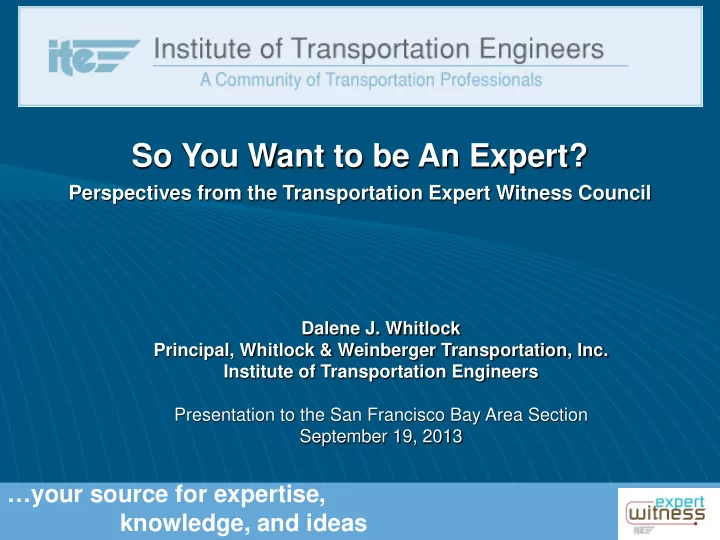

So You Want to be An Expert? Perspectives from the Transportation Expert Witness Council Dalene J. Whitlock Principal, Whitlock & Weinberger Transportation, Inc. Institute of Transportation Engineers Presentation to the San Francisco Bay Area Section September 19, 2013 …your source for expertise, knowledge, and ideas
What Does a Transportation Expert Do? • Help sort out the facts after a crash and determine what they mean. • Assist the attorney with technical aspects related to a crash. • Assess if the deficiency is related to the driver, vehicle or transportation infrastructure.
What Does a Transportation Expert Ask? • Were corrective measures necessary or applied? • Is a change to the transportation system reasonable or necessary? • Suggest changes to enhance safety and risk management.
What Does “Expert Witness” Mean? • Expert Witness : A person who assists the attorney and client in the litigation process because he/she has special knowledge in a particular field. This entitles them to testify about their opinion on the meaning of facts. • Requires experience to develop special knowledge: • No surprise that 75% are greater than 50 years old • However, 18% over 70 years old • Need exists to develop people more in the middle of their careers into the role of transportation experts
How Do You Become an Expert? Establish an area of interest Understand tort liability Gain technical competence Build credentials
Establish an Area of Interest • Understand development of policies, procedures and requirements • Current Issues: Traffic Control Signs and Signals Roadway Design Maintenance and Construction Pedestrians/Bicycles Work Zones Transit Facilities Automated Enforcement
Understand Tort Liability • Know roles of an attorney and their purpose in the U.S. legal system • Know roles of an expert and the role’s relationship to the civil and criminal court system • Know the differences between depositions and trial testimony
Gain Technical Competence • Research new and emerging issues • Build a reference library • Gain work experience on technical projects • Attend or teach seminar classes and workshops • Write Articles, reports, research, presentations • Understand realistic & practical, day to day, implementation of measures. • Become an information resource if someone has a question
Build Your Credentials • Education • Registration / certification • Experience • Technical involvement • Presentations • Publications • Field investigations / court experience • Prepare a resume or Curriculum Vitae (CV)
Get Case Experience • Associate with known experts • Seek involvement and court experience • Find a Mentor – Be a Mentor • Get involved – Make yourself a better engineer
ITE Resource: Transportation Expert Witness Council • Mission: • Foster ethical conduct • Promote professional development • Advance knowledge and skills that improve transportation safety • History: • Chartered by ITE in 1986 • 24 Founding Members • Currently 500+ members
ITE Resource: Expert Witness Directory • Accessible through the ITE web site • Expert Witness Council members • Listing input and updated by individual • Selection of specialty area • No verification of data • No endorsement by Council or ITE • Searchable directory • Free to Council Members
Questions ? ? ?
Recommend
More recommend